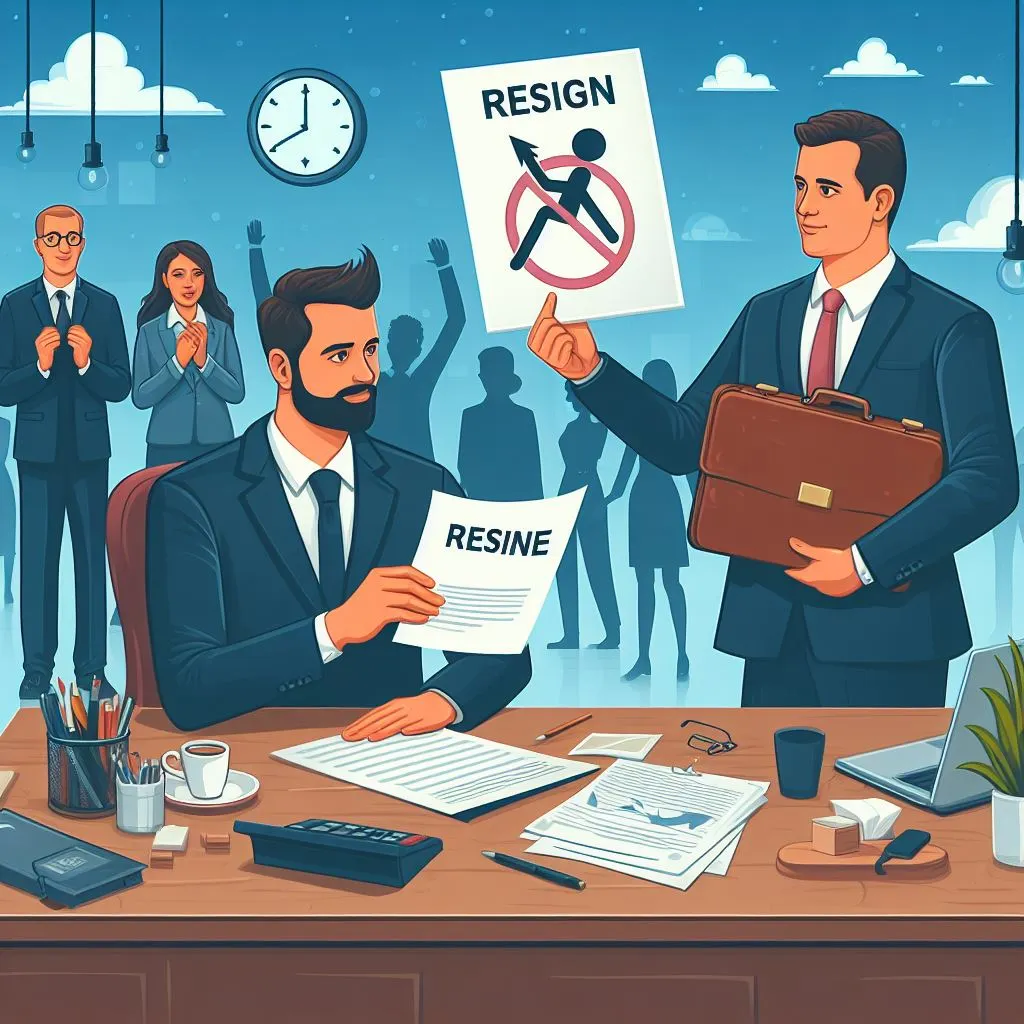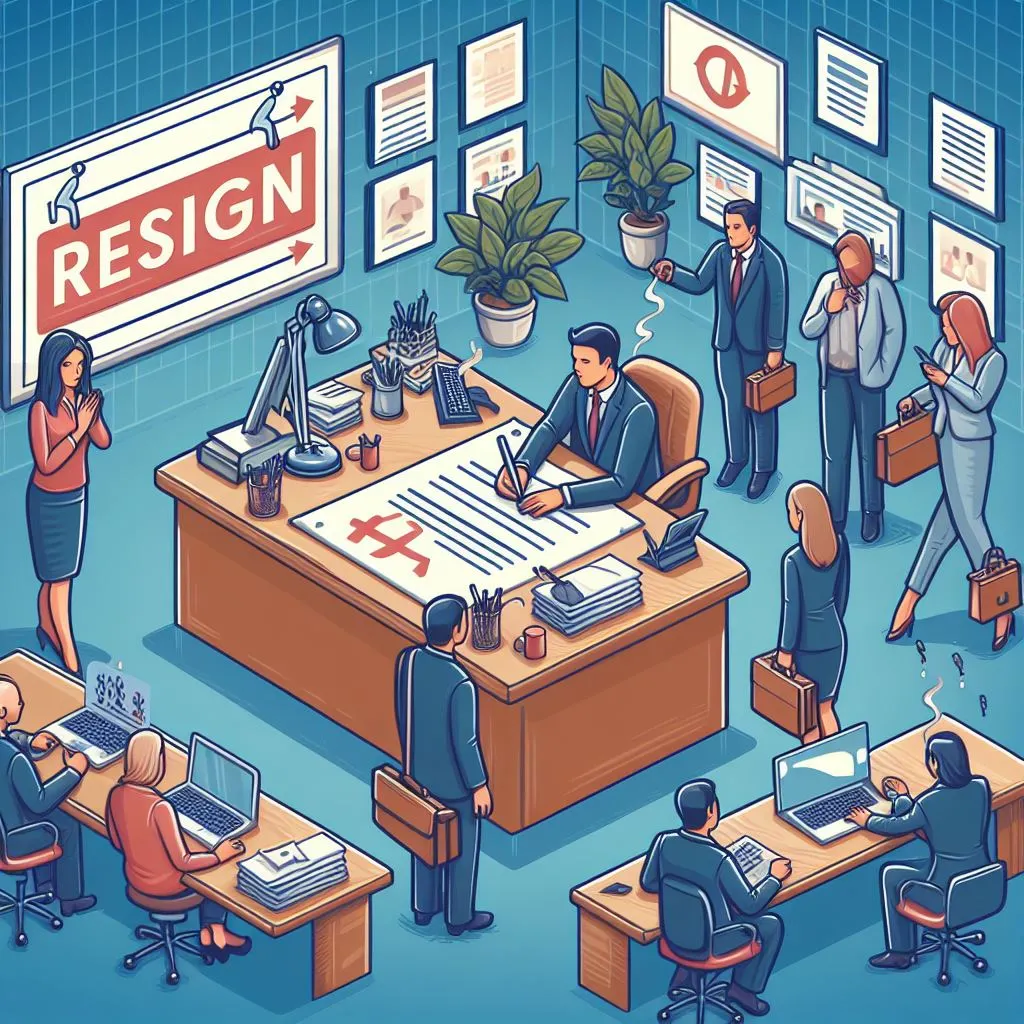Resigning from your job can be a difficult decision, especially if you have spent a long time working for the same company. You may have mixed feelings about leaving your colleagues, your boss, and your projects behind. However, sometimes quitting is the best option for your career growth, personal satisfaction, or well-being.
Whatever your reason for resigning, you should always do it in a professional and graceful manner. This means giving adequate notice, communicating clearly, and maintaining a positive attitude. Resigning professionally can help you preserve your reputation, build your network, and secure future opportunities.
In this article, we will share 10 tips to help you resign from your job with professionalism and pride. We will also provide some examples, case studies, and statistics to illustrate the benefits of quitting the right way.
Tip 1: Confirm and finalise the details of your new employment
If you are leaving your current job for a new one, make sure you have all the details confirmed and finalised before you resign. This includes signing the offer letter, agreeing on the start date, and completing any background checks or paperwork. You don’t want to quit your job and then find out that the new one is not guaranteed or has different terms than you expected.
According to a survey by CareerBuilder, 51% of employers have retracted a job offer after finding out that the candidate lied on their resume or application. Therefore, it is important to be honest and accurate about your qualifications, experience, and references when applying for a new job.
Tip 2: Make a transition plan for your team
One of the most professional things you can do when resigning is to make a transition plan for your team. This means creating a list of your ongoing tasks, projects, and responsibilities and assigning them to other team members or your manager. You should also provide any relevant documents, files, or contacts that are needed to complete the work.
A transition plan can help your team cope with your absence and avoid any delays or disruptions in the workflow. It can also show your manager and colleagues that you care about the success of the company and that you are willing to help them during the transition period.
For example, when Sarah decided to quit her job as a marketing manager, she created a detailed transition plan for her team. She divided her tasks into three categories: urgent, important, and optional. She then assigned each task to a team member who had the skills and availability to handle it. She also wrote a brief summary of each project, its status, and its deadline. She shared the transition plan with her manager and her team and offered to train them on any unfamiliar tasks. Her team appreciated her effort and was able to continue the work smoothly after she left.

Tip 3: Write a formal resignation letter
A formal resignation letter is a document that informs your employer of your intention to quit your job. It should include the following information:
- Your name and position
- The date of the letter
- The name and title of your manager or supervisor
- The date of your last day of work
- A brief explanation of why you are resigning (optional)
- A statement of gratitude for the opportunity and the experience (optional)
- An offer of assistance during the transition period (optional)
- A professional closing and your signature
A resignation letter can serve as a formal record of your departure and can help you avoid any misunderstandings or disputes. It can also help you leave a positive impression on your employer and express your appreciation for the job.
Here is an example of a resignation letter:
Dear Mr. Smith,
Please accept this letter as my formal notice of resignation from ABC Company, effective March 31, 2024. I have accepted a new position as a senior project manager at XYZ Company.
I would like to thank you for the opportunity to work with you and the ABC team for the past three years. I have learned a lot from you and I have enjoyed being part of the company’s growth and success.
I am committed to ensuring a smooth and seamless transition for my team and my clients. I have prepared a transition plan that outlines my current projects and their status, and I have assigned them to other team members. I am also available to train or assist them as needed until my last day of work.
I wish you and the company all the best in the future. Please let me know if there is anything else I can do to help during this transition period.
Sincerely,
Jane Doe Tip 4: Tell your manager before anyone else
When you decide to resign, you should always tell your manager before anyone else. Your manager deserves to be the first to know, as they will need to make arrangements for your replacement, your transition, and your exit. Telling your manager first can also show respect and professionalism and prevent any rumours or gossip from spreading.
You should tell your manager in person, if possible, or by phone or video call, if not. You should avoid resigning by email, text, or social media, as these methods can seem impersonal and disrespectful. You should also prepare for the conversation by rehearsing what you will say, anticipating any questions or reactions, and bringing your resignation letter with you.
When you talk to your manager, you should be polite, positive, and brief. You should state the reason for your resignation, the date of your last day, and your willingness to help with the transition. You should also thank your manager for the opportunity and the support, and express your hope for staying in touch.
For example, when John decided to quit his job as a software engineer, he scheduled a meeting with his manager to tell him the news. He explained that he had received an offer from another company that matched his career goals and interests. He also told him that his last day would be in two weeks and that he had prepared a transition plan for his projects. He thanked his manager for his mentorship and guidance and said that he valued their relationship. His manager was surprised but supportive and appreciated John’s honesty and professionalism.
Tip 5: Resign with your letter in person
After you tell your manager verbally, you should resign with your letter in person. This means handing over your resignation letter to your manager and asking them to sign it as an acknowledgment. You should also keep a copy of the letter for your own records.
Resigning with your letter in person can help you formalise your resignation and avoid any confusion or miscommunication. It can also help you document the date and time of your resignation, which can be useful for legal or financial purposes.
For example, when Lisa decided to quit her job as a sales representative, she resigned with her letter in person. She gave her resignation letter to her manager and asked him to sign it. She also made a copy of the letter and kept it in her personal file. She then emailed a scanned version of the letter to the human resources department, as per the company policy.
Tip 6: Provide adequate notice
When you resign from your job, you should provide adequate notice to your employer. This means giving them enough time to find a replacement, train them, and transfer your work. The amount of notice you should give depends on your contract, your company policy, and your industry norms. However, a common practice is to give at least two weeks of notice, or more if you have a senior or specialised role.
Providing adequate notice can help you maintain a good relationship with your employer and show respect for their time and resources. It can also help you avoid any penalties or consequences for leaving abruptly or without notice.
For example, when Mark decided to quit his job as a graphic designer, he provided adequate notice to his employer. He checked his contract and found out that he had to give at least four weeks of notice, as he had a key role in the company. He respected the contract and gave his employer four weeks of notice, which allowed them to find and train a new graphic designer.
Tip 7: Pack away personal items from your workspace
Before you leave your job, you should pack away any personal items from your workspace. This includes any photos, decorations, books, or equipment that belong to you. You should also return any items that belong to the company, such as keys, badges, laptops, or phones.
Packing away personal items from your workspace can help you clear your space and make room for the next person who will occupy it. It can also help you avoid leaving behind any important or valuable items that you may need later.
For example, when Maria decided to quit her job as a teacher, she packed away personal items from her workspace. She took down her posters, paintings, and plants from the walls and shelves. She also collected her books, notebooks, and pens from the drawers and cabinets. She returned her school laptop, phone, and ID card to the administration office. She left her workspace clean and tidy for
Thank you for your feedback. I’m glad you liked the article so far. Here are the remaining tips to resign your job with professionalism and pride.
Tip 8: Stay positive and avoid negativity
When you resign from your job, you should stay positive and avoid negativity. This means focusing on the positive aspects of your job, such as the skills you learned, the projects you completed, and the relationships you built. You should also avoid criticising or complaining about your employer, your manager, your colleagues, or your work environment. Even if you had a bad experience at your job, you should not burn any bridges or damage your reputation.
Staying positive and avoiding negativity can help you leave your job on a good note and maintain a professional image. It can also help you keep your network intact and get positive references or recommendations in the future.
For example, when David decided to quit his job as a customer service representative, he stayed positive and avoided negativity. He did not badmouth his employer or his coworkers, even though he was unhappy with the low pay, the long hours, and the rude customers. He instead thanked his employer for the opportunity and praised his coworkers for their teamwork and support. He also highlighted the skills and knowledge he gained from the job, such as communication, problem-solving, and customer satisfaction.

Tip 9: Prepare for exit interview
An exit interview is a meeting that your employer may conduct with you before you leave your job. The purpose of an exit interview is to gather feedback from you about your job, your employer, and your work experience.
Your employer may ask you questions such as:
- Why are you leaving the job?
- What did you like or dislike about the job?
- How was your relationship with your manager and your colleagues?
- What are the strengths and weaknesses of the company?
- What suggestions do you have to improve the company or the job?
Be prepared for an exit interview by reviewing your job description, your performance reviews, and your resignation letter. You should also think of some constructive and honest feedback that you can provide to your employer. You should avoid being too negative or too positive, as both can seem insincere or unprofessional. You should also avoid disclosing any confidential or sensitive information that you may have learned from your job.
An exit interview can be a valuable opportunity for you to share your insights and opinions with your employer. It can also help you end your job on a positive and respectful note and leave a lasting impression on your employer.
For example, when Emma decided to quit her job as a nurse, she was prepared for an exit interview. She answered the questions from her employer with honesty and tact. She explained that she was leaving the job to pursue a higher degree in nursing. She also expressed her appreciation for the job and the company and mentioned some of the things she enjoyed, such as the patient care, the training, and the benefits. She also gave some constructive feedback on how the company could improve the work environment, such as by reducing the workload, increasing the staff, and providing more support. She did not reveal any personal or medical information that she had learned from her patients or her colleagues.
Tip 10: Say goodbye and thank you to your colleagues
The last tip to resign your job with professionalism and pride is to say goodbye and thank you to your colleagues. Your colleagues are the people who worked with you, supported you, and learned from you during your time at the job. You should show your appreciation and gratitude to them by saying goodbye and thanking them in person, by email, or by phone. You should also share your contact information and invite them to stay in touch with you.
Saying goodbye and thanking your colleagues can help you strengthen your network and maintain your friendships. It can also help you create a positive impression and a lasting memory with your colleagues.
For example, when James decided to quit his job as a journalist, he said goodbye and thanked his colleagues. He visited each of his colleagues in their offices and thanked them for their collaboration and friendship. He also sent a group email to his colleagues, expressing his gratitude and appreciation for their work and support. He also shared his personal email and phone number and encouraged them to keep in touch with him.
Summary
Resigning from your job can be a challenging and stressful process, but it can also be a rewarding and satisfying one. By following these 10 tips, you can resign from your job with professionalism and pride and leave a positive and lasting impression on your employer and your colleagues. You can also prepare yourself for a new and exciting chapter in your career and your life.
Here are 10 tips to resign your job with professionalism and pride:
- Confirm and finalise the details of your new employment
- Make a transition plan for your team
- Write a formal resignation letter
- Tell your manager before anyone else
- Resign with your letter in person
- Provide adequate notice
- Pack away personal items from your workspace
- Stay positive and avoid negativity
- Be prepared for an exit interview
- Say goodbye and thank you to your colleagues
We hope you find this article helpful and informative. If you have any questions or comments, please feel free to contact us. We wish you all the best in your future endeavours.


